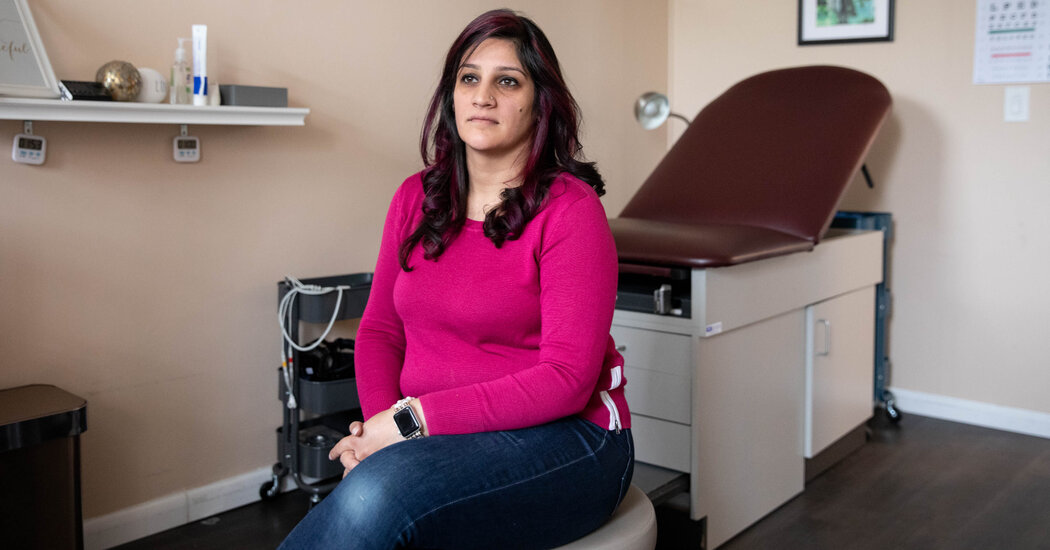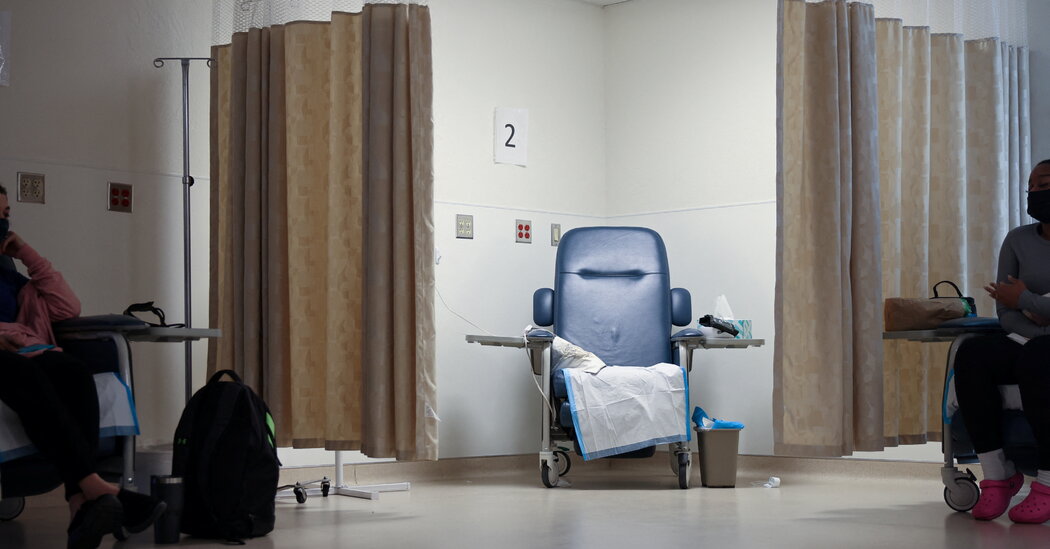Women can no longer get a legal abortion in two states.Although Roe v. Wade remains the law of the land, women can no longer get a legal abortion in two states, Oklahoma and South Dakota. In at least one other, Missouri, the only clinic is booked and not accepting new appointments. And in a fourth state, Wisconsin, clinics will not schedule abortions for after the end of the Supreme Court’s term in late June.Before May 2, when a draft Supreme Court opinion that would overturn Roe was leaked, there had been at least one abortion clinic in every state. But in some states, health care providers aren’t waiting for the actual decision to be issued to start operating as if Roe were overturned.“It’s already happening,” said Caitlin Myers, a professor of economics at Middlebury College who studies abortion accessibility. She is leading a national survey of abortion clinics and supplied data on her recent findings, which was verified by The New York Times.The changes in the last few weeks suggest how quickly an overturning of Roe could reduce abortion access across the South and Midwest, which would be a hard-fought victory for the anti-abortion movement. A survey published Wednesday by the Guttmacher Institute found that abortions had increased around the country between 2017 and 2020, reversing decades of declines. Around one in five pregnancies ended in abortion during that period.Roe guarantees a constitutional right to abortion until the point of fetal viability, around 23 weeks, and without it, around half of states are expected to ban the procedure. Many of those states already had limited access — six had a single clinic, and three had two — and various restrictions that made abortions harder to get. Now it is changing from hard to impossible, at least without crossing state lines.In Oklahoma, clinics have stopped operating because the state passed a new ban, even though it clearly conflicts with Roe. “We haven’t had abortion for two and a half weeks,” said Susan Braselton, a clinic escort and a board member of the Roe Fund in Oklahoma, which helps patients finance abortions. Ms. Braselton said she had expected intervention from the courts to stop the law from being enforced: “I would never have thought this would happen.”Jim Olsen, a Republican state representative in Oklahoma who has been a leader on adding several abortion restrictions in the state, said, “This is something that people have worked on and prayed for for 50 years, so it’s a tremendous victory.”Read More on the U.S. Abortion DebateEvolving Language: As they fight for abortion rights, progressive groups and organizations are adopting more inclusive terms, such as “pregnant people” and “cheastfeeding.”Sports: The end of Roe v. Wade could have far-reaching implications for college athletes across the nation — and Oklahoma’s mainstay softball championships in particular.Without Exception: While most of the population supports carve-outs allowing abortions in cases like rape or incest, many of the bans that would go into effect after Roe do away with them.Mental Health: Anti-abortion groups argue that having an abortion can affect a woman’s mental health. But a new study shows that being denied one can be more harmful.The only clinic in South Dakota, Planned Parenthood in Sioux Falls, which also served patients from North Dakota and Minnesota, performed its last abortion Monday, even though the state has not yet banned it. Abortions at the clinic were already sporadic. A Minnesota doctor flew in around once a month to provide them.And in some other states, legal abortion has become much more scarce. In Idaho there were four clinics, but Planned Parenthood in Boise closed June 1. At another, Compassionate Abortion Care in Boise, the only doctor is set to take a summer vacation, and staff members are telling patients that abortion may not be legal by the time he returns. A third is offering only medication abortion.At Planned Parenthood clinics across the country, phone recordings tell callers that abortion remains legal and accessible, but some have stopped scheduling abortions.A banner at the top of the website for Planned Parenthood of Wisconsin says: “Our doors are open. Planned Parenthood of Wisconsin will continue to help patients get the care they need — including safe and legal abortion. No matter what.” But the organization there decided to stop offering any new appointments for abortion after June 25, anticipating that the court might release its opinion two days later, on its last scheduled decision day. Wisconsin still has an 1849 law on the books criminalizing abortion.Dr. Allie Linton, the organization’s associate medical director, said the decision was in part because of worries that it would be hard to contact patients if their appointments needed to be canceled. She also said the group’s leaders were “cognizant of the significant trauma that might come for patients and staff if we are in the middle of a procedure or the middle of a procedure day, and have to tell patients we cannot provide care.”The Wisconsin clinics have made contingency plans on days this month when the Supreme Court has been expected to issue opinions. Many members of the staff plan to spend the week of June 27 training at new clinics in Illinois, anticipating they may need to relocate so that Wisconsin patients can travel there to obtain care.At Planned Parenthood Great Northwest, which operates clinics in Hawaii, Alaska, Washington, Idaho, Indiana and Kentucky, five clinics closed last month as the organization started shuffling resources. Idaho, Indiana and Kentucky are expected to ban most abortions if Roe is overturned, so the organization is trying to expand telemedicine abortion in the remaining states and to help patients get to out-of-state providers.As clinics schedule new patients, they are warning them that the legal status of abortion may be in flux. “Our patient navigators, when they are scheduling, they give patients a heads up and say, ‘Hey, just so you know, there may be a legal change,’” said Katie Rodihan, a spokeswoman for the clinics.Danika Severino Wynn, the vice president for abortion access at the Planned Parenthood Federation of America, said in a statement that local affiliates were independently deciding what to do as the court’s decision nears.“Planned Parenthood affiliates in these states that are extremely hostile to abortion access are being forced to make the difficult decision whether or not to suspend providing abortion services following the court’s decision, due to their state’s legal landscape,” she said. The State of Roe v. WadeCard 1 of 4What is Roe v. Wade?
Read more →




